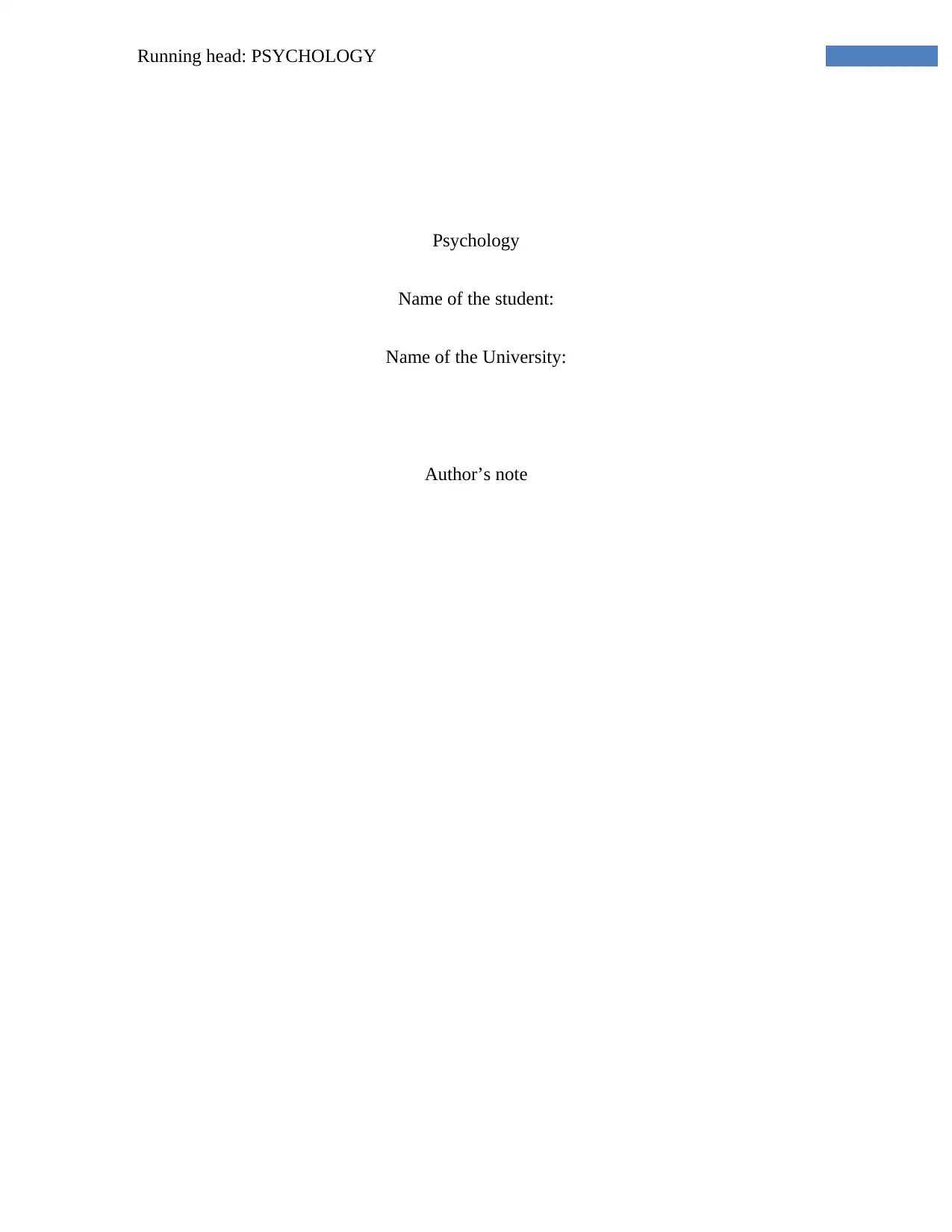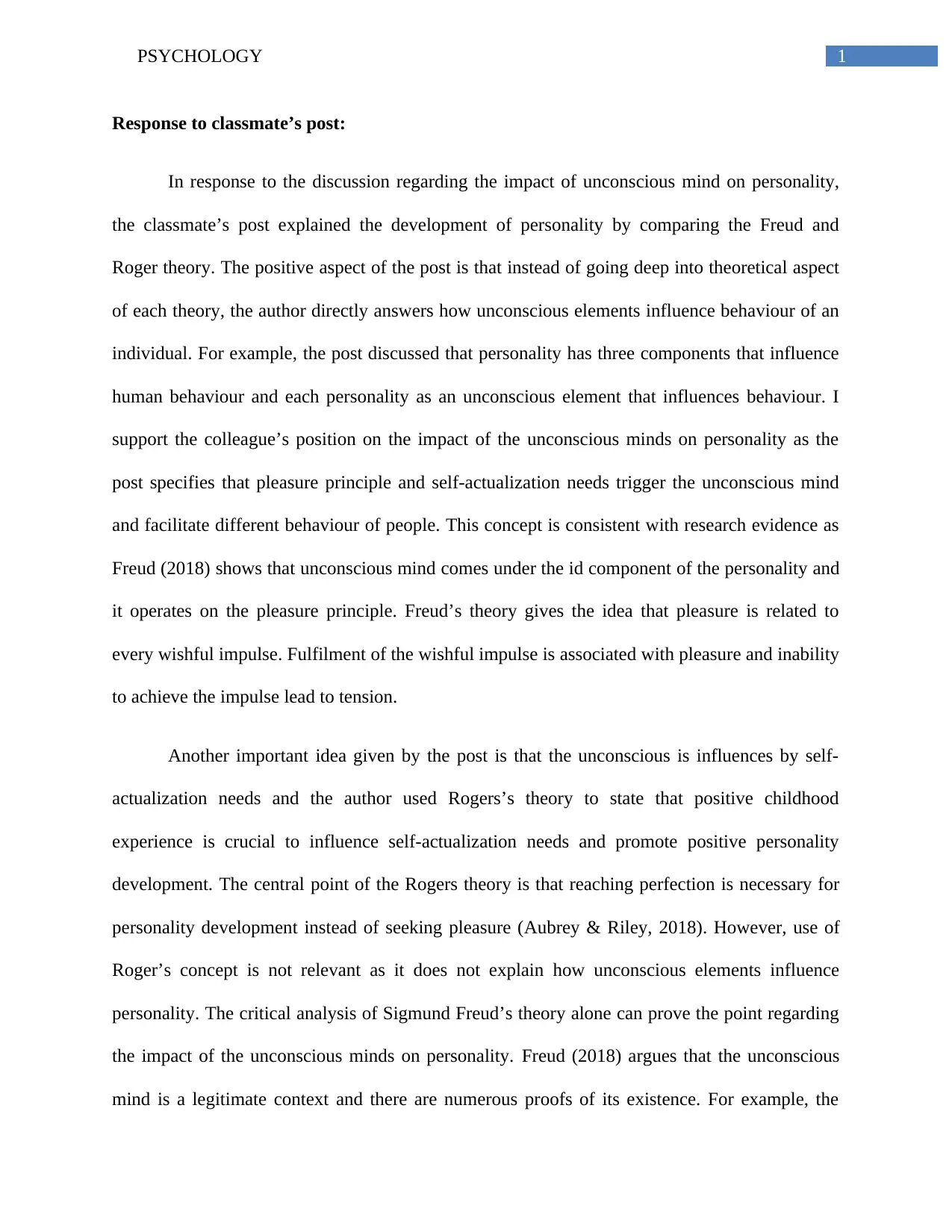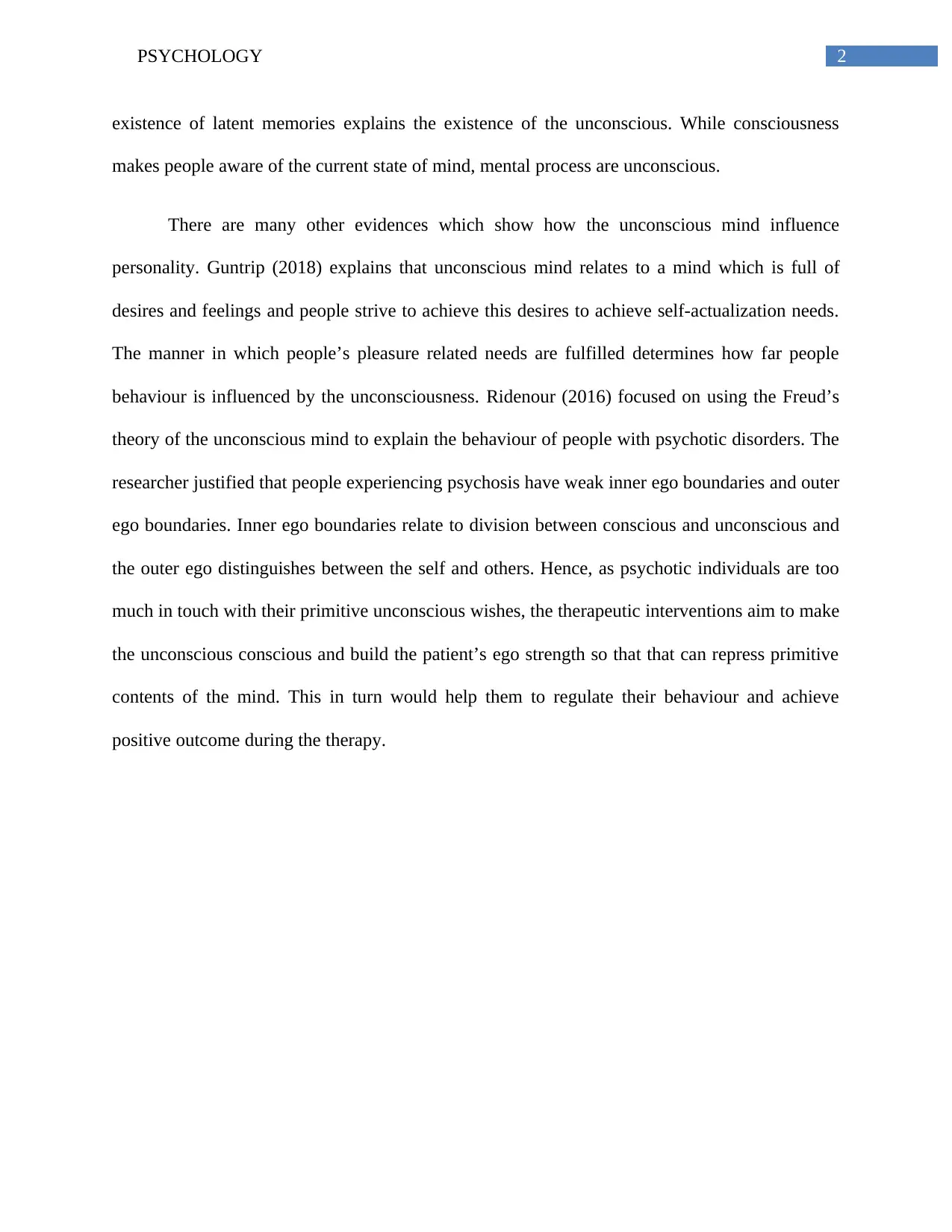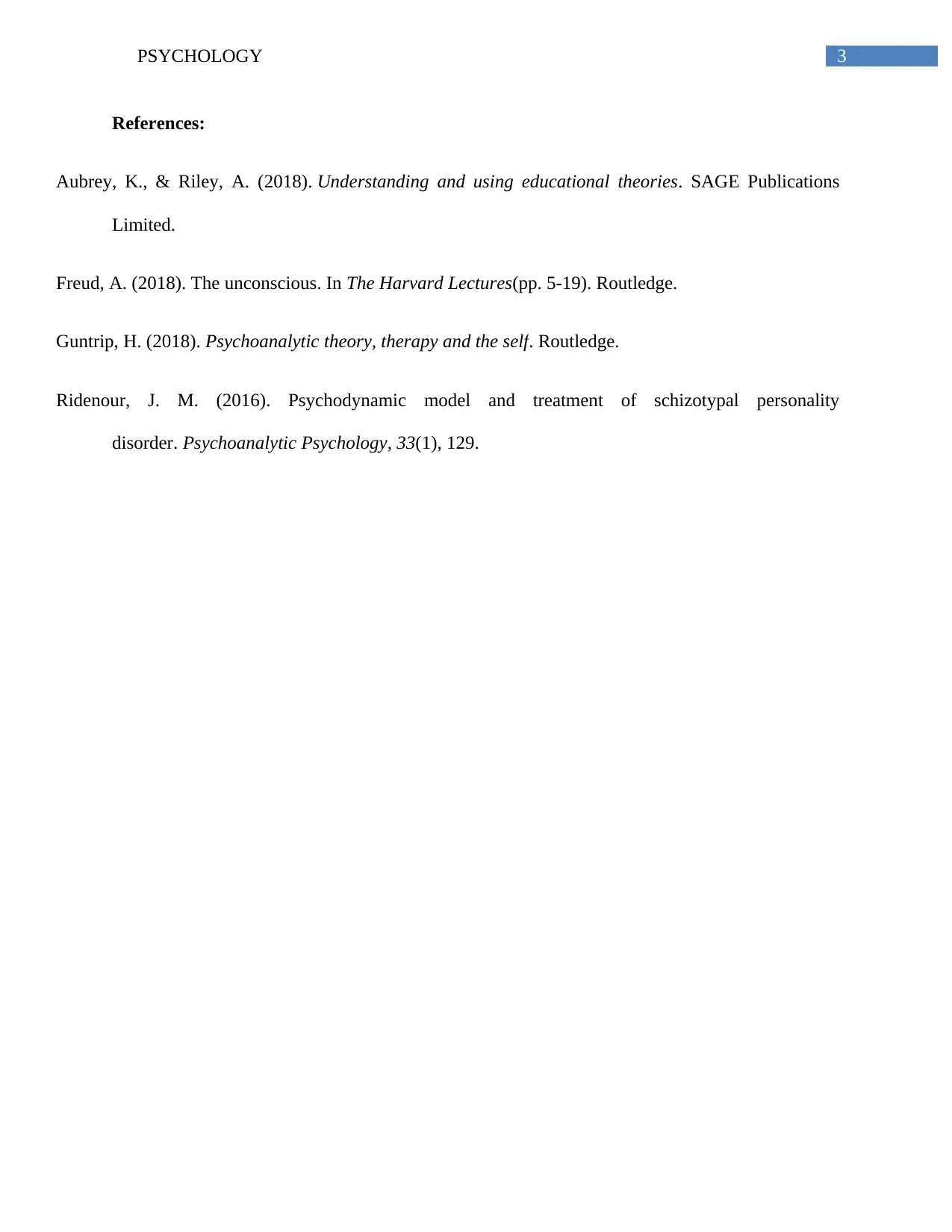Psychology: Course Discussion on the Unconscious Mind's Influence
VerifiedAdded on 2023/04/23
|4
|682
|499
Discussion Board Post
AI Summary
This discussion board post examines the influence of the unconscious mind on personality, focusing on the theories of Freud and Rogers. The author analyzes a classmate's post, highlighting the interplay between the unconscious, personality, and behavior, and the importance of self-actualization. The post also explores the concept of the pleasure principle and the impact of early childhood experiences. The author further supports their arguments by referencing Freud's theory of the unconscious mind and the impact of the unconscious on psychotic disorders, and the role of ego boundaries. The post concludes with references to relevant academic sources supporting the discussion.

Running head: PSYCHOLOGY
Psychology
Name of the student:
Name of the University:
Author’s note
Psychology
Name of the student:
Name of the University:
Author’s note
Paraphrase This Document
Need a fresh take? Get an instant paraphrase of this document with our AI Paraphraser

1PSYCHOLOGY
Response to classmate’s post:
In response to the discussion regarding the impact of unconscious mind on personality,
the classmate’s post explained the development of personality by comparing the Freud and
Roger theory. The positive aspect of the post is that instead of going deep into theoretical aspect
of each theory, the author directly answers how unconscious elements influence behaviour of an
individual. For example, the post discussed that personality has three components that influence
human behaviour and each personality as an unconscious element that influences behaviour. I
support the colleague’s position on the impact of the unconscious minds on personality as the
post specifies that pleasure principle and self-actualization needs trigger the unconscious mind
and facilitate different behaviour of people. This concept is consistent with research evidence as
Freud (2018) shows that unconscious mind comes under the id component of the personality and
it operates on the pleasure principle. Freud’s theory gives the idea that pleasure is related to
every wishful impulse. Fulfilment of the wishful impulse is associated with pleasure and inability
to achieve the impulse lead to tension.
Another important idea given by the post is that the unconscious is influences by self-
actualization needs and the author used Rogers’s theory to state that positive childhood
experience is crucial to influence self-actualization needs and promote positive personality
development. The central point of the Rogers theory is that reaching perfection is necessary for
personality development instead of seeking pleasure (Aubrey & Riley, 2018). However, use of
Roger’s concept is not relevant as it does not explain how unconscious elements influence
personality. The critical analysis of Sigmund Freud’s theory alone can prove the point regarding
the impact of the unconscious minds on personality. Freud (2018) argues that the unconscious
mind is a legitimate context and there are numerous proofs of its existence. For example, the
Response to classmate’s post:
In response to the discussion regarding the impact of unconscious mind on personality,
the classmate’s post explained the development of personality by comparing the Freud and
Roger theory. The positive aspect of the post is that instead of going deep into theoretical aspect
of each theory, the author directly answers how unconscious elements influence behaviour of an
individual. For example, the post discussed that personality has three components that influence
human behaviour and each personality as an unconscious element that influences behaviour. I
support the colleague’s position on the impact of the unconscious minds on personality as the
post specifies that pleasure principle and self-actualization needs trigger the unconscious mind
and facilitate different behaviour of people. This concept is consistent with research evidence as
Freud (2018) shows that unconscious mind comes under the id component of the personality and
it operates on the pleasure principle. Freud’s theory gives the idea that pleasure is related to
every wishful impulse. Fulfilment of the wishful impulse is associated with pleasure and inability
to achieve the impulse lead to tension.
Another important idea given by the post is that the unconscious is influences by self-
actualization needs and the author used Rogers’s theory to state that positive childhood
experience is crucial to influence self-actualization needs and promote positive personality
development. The central point of the Rogers theory is that reaching perfection is necessary for
personality development instead of seeking pleasure (Aubrey & Riley, 2018). However, use of
Roger’s concept is not relevant as it does not explain how unconscious elements influence
personality. The critical analysis of Sigmund Freud’s theory alone can prove the point regarding
the impact of the unconscious minds on personality. Freud (2018) argues that the unconscious
mind is a legitimate context and there are numerous proofs of its existence. For example, the

2PSYCHOLOGY
existence of latent memories explains the existence of the unconscious. While consciousness
makes people aware of the current state of mind, mental process are unconscious.
There are many other evidences which show how the unconscious mind influence
personality. Guntrip (2018) explains that unconscious mind relates to a mind which is full of
desires and feelings and people strive to achieve this desires to achieve self-actualization needs.
The manner in which people’s pleasure related needs are fulfilled determines how far people
behaviour is influenced by the unconsciousness. Ridenour (2016) focused on using the Freud’s
theory of the unconscious mind to explain the behaviour of people with psychotic disorders. The
researcher justified that people experiencing psychosis have weak inner ego boundaries and outer
ego boundaries. Inner ego boundaries relate to division between conscious and unconscious and
the outer ego distinguishes between the self and others. Hence, as psychotic individuals are too
much in touch with their primitive unconscious wishes, the therapeutic interventions aim to make
the unconscious conscious and build the patient’s ego strength so that that can repress primitive
contents of the mind. This in turn would help them to regulate their behaviour and achieve
positive outcome during the therapy.
existence of latent memories explains the existence of the unconscious. While consciousness
makes people aware of the current state of mind, mental process are unconscious.
There are many other evidences which show how the unconscious mind influence
personality. Guntrip (2018) explains that unconscious mind relates to a mind which is full of
desires and feelings and people strive to achieve this desires to achieve self-actualization needs.
The manner in which people’s pleasure related needs are fulfilled determines how far people
behaviour is influenced by the unconsciousness. Ridenour (2016) focused on using the Freud’s
theory of the unconscious mind to explain the behaviour of people with psychotic disorders. The
researcher justified that people experiencing psychosis have weak inner ego boundaries and outer
ego boundaries. Inner ego boundaries relate to division between conscious and unconscious and
the outer ego distinguishes between the self and others. Hence, as psychotic individuals are too
much in touch with their primitive unconscious wishes, the therapeutic interventions aim to make
the unconscious conscious and build the patient’s ego strength so that that can repress primitive
contents of the mind. This in turn would help them to regulate their behaviour and achieve
positive outcome during the therapy.
⊘ This is a preview!⊘
Do you want full access?
Subscribe today to unlock all pages.

Trusted by 1+ million students worldwide

3PSYCHOLOGY
References:
Aubrey, K., & Riley, A. (2018). Understanding and using educational theories. SAGE Publications
Limited.
Freud, A. (2018). The unconscious. In The Harvard Lectures(pp. 5-19). Routledge.
Guntrip, H. (2018). Psychoanalytic theory, therapy and the self. Routledge.
Ridenour, J. M. (2016). Psychodynamic model and treatment of schizotypal personality
disorder. Psychoanalytic Psychology, 33(1), 129.
References:
Aubrey, K., & Riley, A. (2018). Understanding and using educational theories. SAGE Publications
Limited.
Freud, A. (2018). The unconscious. In The Harvard Lectures(pp. 5-19). Routledge.
Guntrip, H. (2018). Psychoanalytic theory, therapy and the self. Routledge.
Ridenour, J. M. (2016). Psychodynamic model and treatment of schizotypal personality
disorder. Psychoanalytic Psychology, 33(1), 129.
1 out of 4
Related Documents
Your All-in-One AI-Powered Toolkit for Academic Success.
+13062052269
info@desklib.com
Available 24*7 on WhatsApp / Email
![[object Object]](/_next/static/media/star-bottom.7253800d.svg)
Unlock your academic potential
Copyright © 2020–2026 A2Z Services. All Rights Reserved. Developed and managed by ZUCOL.





